Sitting with my wife, Norma, in the Martha’s Vineyard Hospital Cancer Center, I waited for an injection to boost my body’s production of white blood cells. Unexpectedly, I heard applause and cheers. Down the corridor, a bouquet of balloons bobbed at the doorway of a treatment room where staff had gathered. A nurse told me that the joyful commotion was for a patient who had finished chemotherapy. It is a cancer center tradition to celebrate patient milestones.
The patient, a tall, well-dressed woman, walked out of the room holding small gifts and a cupcake. I watched, undone with emotion, at what was the end of her treatment journey and the unknowable beginning of my own. I imagined a day when there would be balloons outside my door.
Two months earlier, in December 2023, having been tired, thirsty, and not at all well for weeks, I did what people do in the age of Google: I consulted the internet and diagnosed myself. I called Martha’s Vineyard Hospital (MVH) to make an appointment with my primary care doctor. Asked the reason for my call, I said I thought I had adult-onset diabetes.
Thankfully, Dr. Maya Koehler relied on more rigorous diagnosis criteria. A sonogram followed by a CAT scan revealed what was described as “a mass” – about the size of a king-sized Snickers bar, according to my measurement yardstick – pressing against my right kidney. This was causing a blockage of the route from the kidney to the bladder.
It was mid-December. I’d just turned seventy-three. Unlike many of my contemporaries, there was no prescription pill box on my kitchen table. I was above such things. I’d planned to spend the final days of the 2023 deer hunting season in the Chilmark woods. Instead, I faced the immediate risk of kidney damage and a probable diagnosis of cancer. “I don’t have time for this,” I thought.
When I moved to the Island thirty-six years ago, MVH was a small, private, nonprofit country hospital housed in a ramshackle, aging cluster of buildings that provided good general care and excellent fishhook removal. Following a period of institutional turmoil, in 2006, under the guidance of a reinvigorated and talented board and new CEO Tim Walsh, the hospital became an affiliate of Mass General Hospital (MGH) in Boston and its parent organization, Partners Health Care, now Mass General Brigham (MGB).
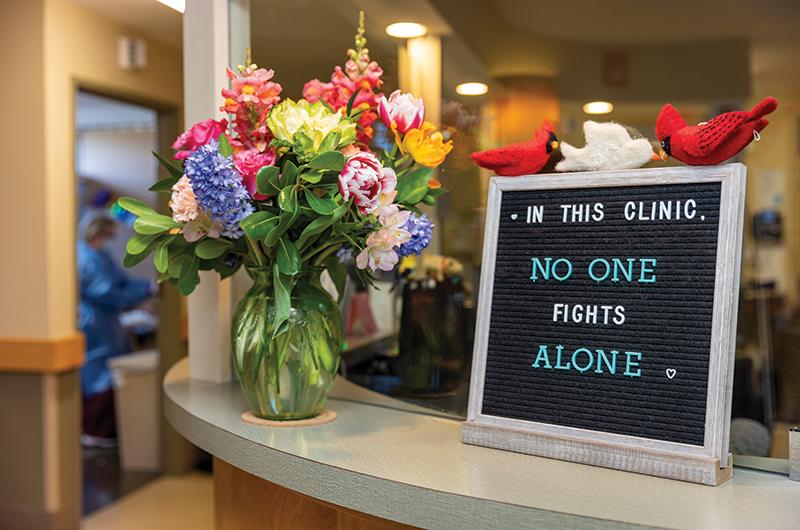
Next, a successful building campaign followed, well exceeding its goal of $42 million. In June 2010, a new state-of-the-art hospital electronically linked to MGH welcomed Islanders and seasonal visitors.
Our small twenty-one-bed Island hospital is now a portal to MGH and the entire MGB system, one of the finest integrated medical institutions in the world. The benefit of that seamless professional connection was apparent when, only two weeks after my initial primary care visit, a team led by MGH urologist Dr. Christopher Dall inserted a stent so my kidney could drain to my bladder. (Thank goodness for anesthesia.)
The next day, as 2023 drew to a close, an orderly wheeled me down a corridor in the bowels of MGH to a waiting interventional radiologist for a biopsy. The doctor, aware of my apprehension, assured me that it was a simple, painless procedure. He would deftly guide a needle into me and capture a piece of tissue that would be used to identify the specific nature of the mass growing against my kidney.
At home in Vineyard Haven the next day, as mortality stalked the edges of my thoughts, Norma and I welcomed the new year and waited for a specific diagnosis.
The Martha’s Vineyard Hospital Cancer Center (MVHCC), formally known as Martha’s Vineyard Hospital Infusion Services, is a separate unit in the east wing that once housed the former emergency room. It’s located off the path of most day-to-day activity, sparing me the casual, sometimes uncomfortable interactions – “Hey, what’s going on?” – that often characterize hospital visits. As I experienced, it is also an oasis of care and compassion.
The center opened in April 2013 following an agreement between our hospital and MGH. The goal was to provide top-level care and consultation for patients who previously would have had to travel frequently to Boston to receive chemotherapy, an already taxing endeavor without having to coordinate travel and lodging. (The center does not provide radiation therapy, so those in need of such treatment must still make that trip.)
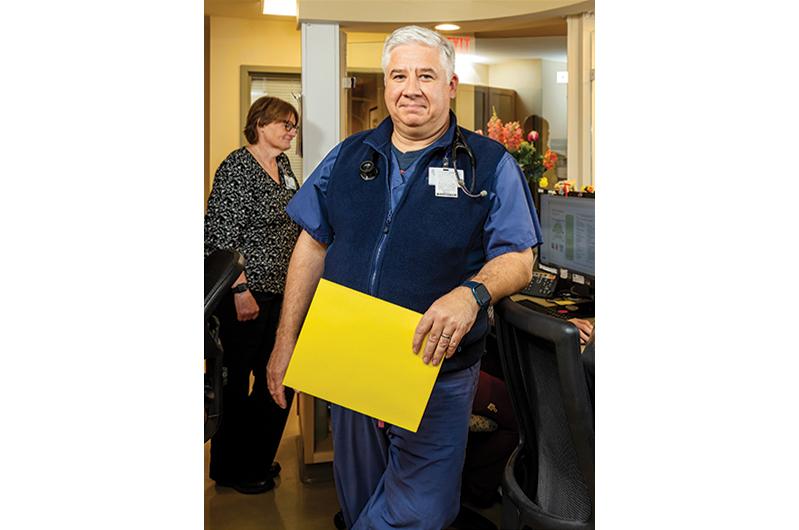
My first appointment was in early January. MGH oncologist Dr. Jeffrey Barnes, who has been one of the attending physicians at the MVHCC since it opened and was named director in 2019, rolled into our lives on an office swivel chair attached to a laptop workstation. He immediately put Norma and me at ease with what he later described as “his little speech,” an introduction, he said, that gives the ensuing conversation “a little bit of structure.”
“I think anybody with a new diagnosis generally has five questions,” he said. “What do I have? Why do I have it? Is anybody in my family at risk of getting it? Is it a risk to the length or quality of my life? And please answer that question first.”
Dr. Barnes explained that I had lymphoma, a cancer derived from the immune system, the cells in our body that fight infection. Specifically, I had what is known as diffuse large B-cell lymphoma, the most common type of non-Hodgkin’s lymphoma diagnosed yearly in the United States. More importantly, he added, “It is a highly treatable and highly curable disease.
“Why do people get lymphoma? We don’t know,” Dr. Barnes continued. “It’s not related to diet, exercise, lifestyle, smoking, or family history. There are no screening programs for lymphoma. It kind of happens when it happens.”
According to the National Cancer Institute state cancer profile by county for the years 2016 to 2020, Dukes County ranks seventh for all stages of non-Hodgkin’s lymphoma, with nineteen incidences per 100,000. The rate has remained stable.
Dr. Barnes, who specializes in lymphoma, assured me the MVHCC “punched above its weight.” The care I would receive here would be as good as the care I would receive at any major medical institution, he said.
Surgery to remove cancer, radiation to destroy cancer in place, medications or chemotherapy, and, more recently, immunotherapy are all among the modern tools used to treat cancers. In my case, because lymphoma is a cancer that originates in the body’s immune system, my treatment would be chemotherapy and immunotherapy.
I was scheduled to receive treatment every twenty-one days for the next five months, six rounds in all. Later, I learned that Dr. Barnes was one of a team of clinical investigators who assisted in developing my life-saving cocktail, a new protocol in large B-cell lymphoma chemotherapy that was approved by the Federal Drug Administration in 2023.
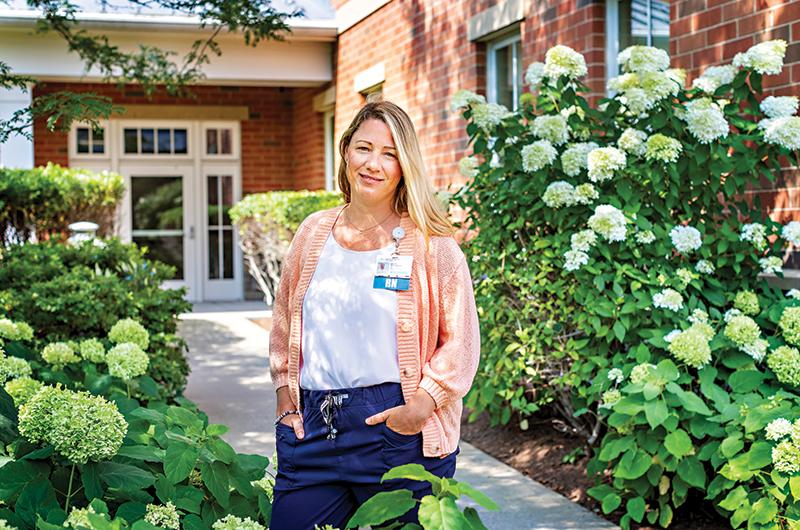
My first chemotherapy session began one week after my initial visit. The first round lasted from 9 a.m. until 7 p.m. – ten long hours. My oncology nurse apologized for the long day, but she explained that the potent cocktail needed to be administered slowly the first time to see how my body would tolerate the drugs. Later sessions lasted about six hours.
The center has six treatment rooms. Each is decorated with Island artwork and equipped with a television, a chair for visitors, and a power-assisted recliner with massage and heat settings for patients – a welcome comfort on a long day attached to an intravenous (IV) solution. I was delighted when I walked into room six to find Butterflies, a 1970 watercolor pen and ink collage by Island artist Will Huntington, my wife’s grandfather, hanging on the wall. Norma and I took that as a good omen.
I was fortunate to have veteran cancer center nurse Sharon Spinney of Oak Bluffs look after me. She also looked after the bird feeders outside my window, which attracted finches, sparrows, cardinals, grackles, red-winged blackbirds, and more. When it came time to insert an IV tube in my arm, the birds were a welcome focus of my attention.
One chemo session followed another, always with a warm greeting by name from the staff. After a routine check of my weight, blood pressure, and oxygen level, I received a saline solution followed by a potentially lethal mix of chemicals.
I was under the watchful eye of Ashley Allanbrook, the nurse director who oversees the department’s day-to-day operations and the center’s six full-time nurses and five per diem nurses. “I also connect with Mass General quite frequently to see how they’re doing, what they do, and how we can leverage their resources and bring those down to the Island,” she said. An oncology nurse by training, Allanbrook was introduced to the hospital as a Northeastern University nursing student in 2006. A resident of Vineyard Haven, she’s worked at the hospital since 2013.
Treatment is not restricted to cancer patients. “For someone with Crohn’s disease, colitis, multiple sclerosis, infections, or rheumatoid arthritis, there are a lot of injectables or infusion medications that can help those patients. We see those patients here as well,” she said.
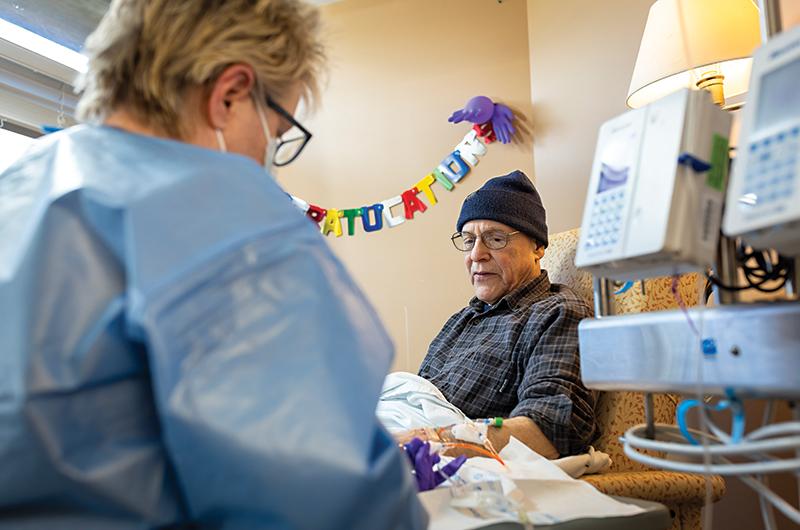
The center has seen a steady growth in patients. In 2023, there were about 3,700 infusion visits, of which more than 1,000 were for cancer treatment.
Allanbrook said the cancer center team strives to provide the best care locally. “It makes such a difference when you’re working with a team of nurses, doctors, medical assistants, and receptionists who all have the same vision and goal,” she said. “And that’s to provide the best care safely, efficiently, and effectively. I don’t want to boast too much, but they are such an amazing team of professionals, and that’s why I come here every day.”
Speaking of Dr. Barnes, Allanbrook said, “He is the best of the best…. I will say, every time we interact, we learn something new that can help our patients.”
Dr. Barnes said that in his administrative role, he spends much time coordinating care between MVH healthcare providers and MGB and advocating for Island patients. “I’m kind of the buck-stops-here person when there’s a challenge to solve,” he said.
On average, Dr. Barnes travels to the cancer center three times a month. What sticks out to him, he said, and what Islanders and visitors should know about the cancer center, and the hospital in general, is the quality and dedication of the staff.
“I remain impressed daily by the practitioners, the nursing staff, the front desk staff, the laboratory staff, the nurse practitioners, and physician assistants; they are really excellent,” he said. “And I’ve spent twenty years practicing medicine in Boston. I know when things
aren’t good.”
He added that healthcare practitioners who dedicate their lives to cancer care “tend to be caring individuals. But the Vineyard is still exemplary.” He attributes that to the closeness of the community and the sense of personal responsibility it fosters.
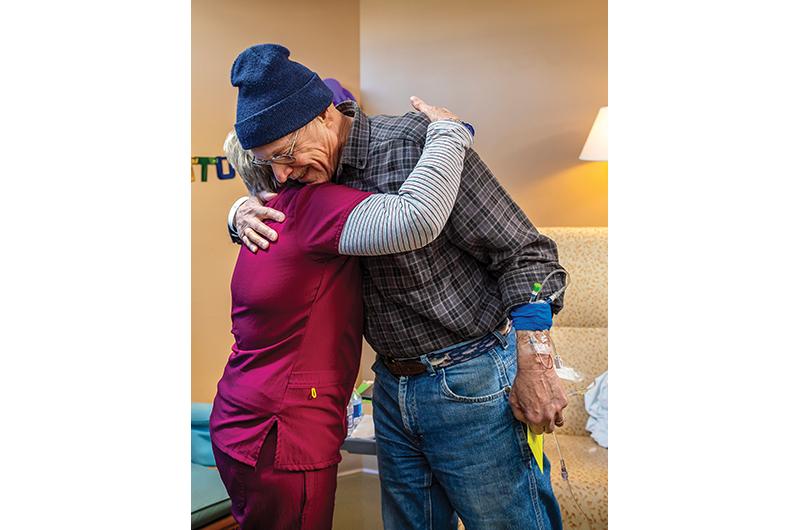
“The staff themselves are so dedicated to supporting their patients and each other. I think that’s part of the hospital’s community and the Island environment, where you’re taking care of your neighbors,” he said, “so that they go the full mile every time.”
Cancer upends your life physically, emotionally, and financially, but life goes on for you, your family, and your friends. The world doesn’t stop. There are bills to be paid, work to get done, meals to be prepared, and day-to-day mundane tasks.
Those first months were trying. I’m five feet, ten inches tall. My winter weight generally hovered around 157 pounds. By late January, I weighed an alarming 142 pounds. Slowly, I began to gain back weight. I was on a pancake and maple syrup diet, I joked to a nurse.
Dr. Barnes told me that I would lose my hair. But I hadn’t. Was I the exception? One morning, not long after my second round, I looked in the bathroom mirror and admired my good head of brown, slightly graying hair before I stepped into the shower. I was shocked as I began to shampoo. My hair came out in unmanageable gobs and clumps. I did what any man would do: I yelled for my wife.
“Norma, look at this,” I said, pointing to what looked like the remains of a wig clogging up the tub floor drain.
“It’s okay, honey,” she said, reassuring but helpless to change the course of events, as was I. Chemotherapy attacks fast-growing cells and does not distinguish between cancer and brown hair.
In the following days, I shed hair like a human Labrador retriever. Worse still, the splotchy nature of my hair loss and bad comb-over made me look like a stringy-haired, late-night convenience store weirdo in a Coen brothers movie.
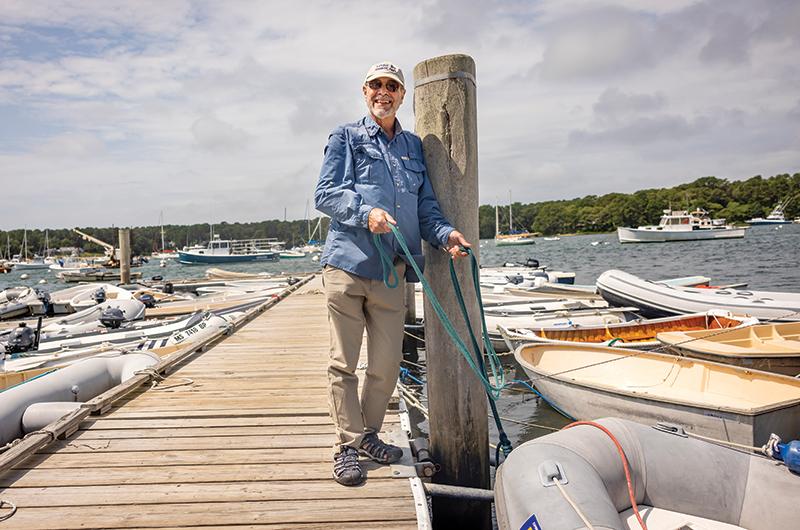
I visited Maddie Maccaferri, owner of Mac’s Barber Shop (now Gypsy Barbershop) in Edgartown. My instructions were simple: I wanted a bald guy’s haircut. Maccaferri refused to take payment. “This is not a haircut you wanted,” she said. I left as my eyes welled with tears at this simple act of kindness.
I didn’t announce that I had cancer on social media; it’s not my style. But I didn’t hide it if there was a reason to bring it up. Still, news has a way of trickling out on this Island. Friends and acquaintances called and emailed offers of support and words of encouragement. One week, I received a letter from Gerard Cole, from upstate New York, who spoke from experience. “Now, you are the person in the room who has cancer,” Cole said, “Not the ‘I know a person with cancer.’”
He urged me to move on, adding, “I found that life became more precious. Friends became more valued. My wife of forty-nine years became more loved and appreciated. Her closeness, touch, and support gave me, every day, a reason to be positive.”
Norma and I had only reached the thirty-three-year mark, but her support would be unwavering. “You’re not leaving me,” she said early in our uncertainty. Our daughter, Marlan, asked if she should come home. “No,” I said. “There’s no reason to.”
There were many offers of help. It’s the Island way. Brian Cioffi drove me up and back to Boston for appointments. Ned Casey cooked weekend dinners. His wife, Tina, sent over a knit navy wool cap for my bald head. Tom Robinson took my trash to the dump.
One morning, medical assistant Becky Kelly cheerfully greeted me at the door. (She has since left the cancer center.) As we chatted, she recounted her own battle with cancer and the philosophy that energizes her positive attitude. She said she wakes up every morning and tells herself, “If I am alive, I’m going to be alive.”
From the very beginning of my journey, I felt very fortunate. I had lost friends to cancer. I knew of people who required radiation and surgery. I had a treatable condition, and I had the support of a wonderful community. As trivial as it may sound, I was even grateful that my condition was discovered at the end of hunting season and that I would be finished with chemo treatments before fishing season.
In March, before my fifth round of treatment, a CAT scan revealed no evidence of lymphoma. “This is fantastic but expected,” Dr. Barnes said as he reviewed the report. One day later, I traveled to MGH, where Dr. Dall removed the stent.
Chemotherapy has a cumulative effect. After each round, I bounced back slower and felt lousier. As she reviewed my blood work before my sixth and final round, veteran cancer center nurse practitioner Barbara Rush told me it was not unusual for patients to ask to skip the last round. The thought had occurred to me. In her explanation of what my body was undergoing, she characterized the confidence, competence, and compassion that were hallmarks of the staff. “Chemotherapy is no joke,” she explained. I would receive regular check-ups in the months ahead, but I was winning the battle.
In early May, five months after I entered the cancer center, I walked down the familiar corridor into room six, where my journey began. I smiled when I saw a celebratory “congratulations” banner with two inflated purple exam gloves pinned to the wall. I settled in for my last treatment.
Six hours later, the final buzzer sounded. Nurse Spinney came into the room and disconnected the IV from my arm. Other nurses crowded into the room and presented me with a signed card from the infusion team that read “Yay!” and a chocolate bomb treat. I stood shakily and said I wanted to hug each nurse, letting them know, “And I’m not a hugger.”
Norma and I walked out of the room past the familiar sign in front of the nurse’s station: “In this clinic, no one fights alone.” Amen, I thought.

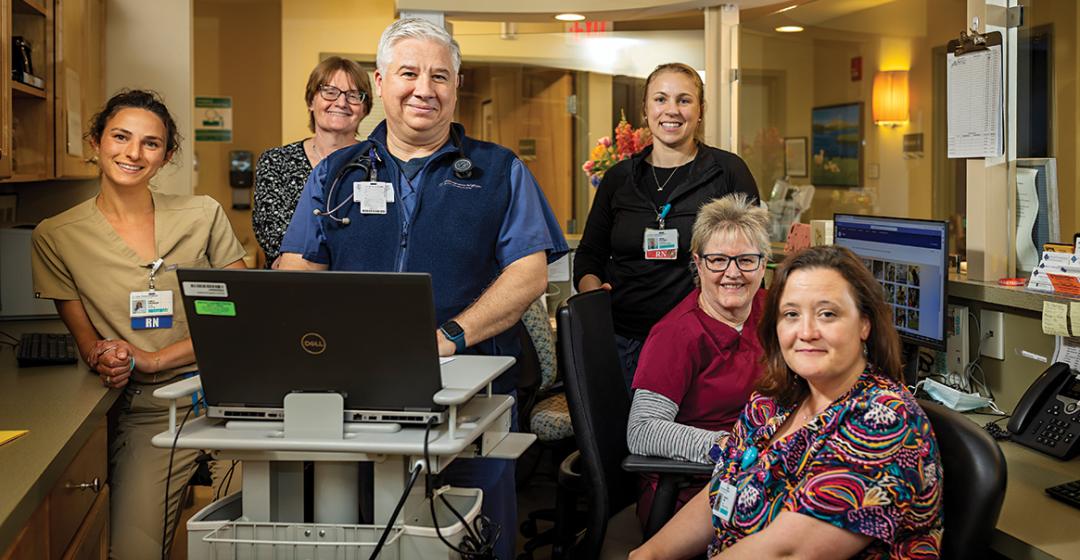


 8 comments
8 comments
Comments (8)